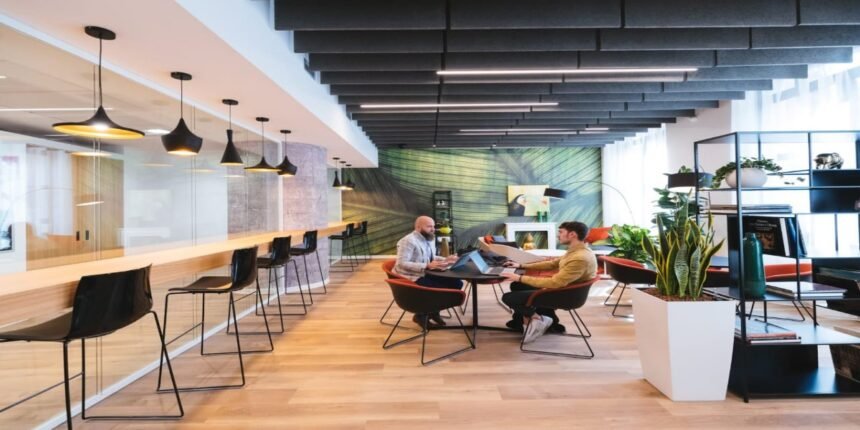Today’s business world is evolving at a breakneck pace, where innovation is not just a buzzword but an essential part of daily operations. Modern companies stay ahead by embracing new technology and integrating it throughout their company. This isn’t just about keeping up with trends; it’s about creating new models of efficiency, improving customer satisfaction, and nurturing a culture of continuous improvement.
Across finance, workplace culture, and marketing, organizations are adopting innovative approaches to remain competitive. Increased technology adoption and digital access are viewed as key drivers of transformation. The projection that global spending on digital transformation will reach $2.8 trillion by 2025 highlights the importance of technology in modern workplaces.
Workplace technology today is a blend of both hardware and software designed to enhance productivity and collaboration, especially for remote teams. This integration has fundamentally transformed how businesses operate, enhancing efficiency and redefining processes. For businesses to remain competitive in a rapidly evolving market, adopting modern technology solutions is essential.
Exploring how companies blend innovation with daily operations reveals technology’s role in business processes, workplace experience, and marketing. Fostering a culture of continuous innovation is vital for competitiveness.
Embracing Smarter Business Processes

Organizations are increasingly turning to digital tools and automation to improve efficiency and streamline operations. The integration of AI in the workplace is seen as a transformative innovation, comparable to the steam engine’s impact during the Industrial Revolution. AI’s capability to automate cognitive functions allows businesses to significantly enhance productivity and creativity.
A substantial majority of employees, approximately 94%, are familiar with generative AI tools, indicating their readiness to adopt AI in business processes. However, many leaders underestimate their employees’ readiness and the extent of AI usage among staff. Formal training and seamless integration into current workflows promote AI adoption. Leaders face the challenge of aligning their teams and addressing barriers to AI implementation, which primarily stem from leadership rather than technological limitations.
Investing in AI tools and fostering an environment for balance experimentation can help businesses realize the full potential of AI in enhancing business processes. One notable example is the use of accounts payable automation solutions, which streamline financial operations, save time, and reduce errors. These digital tools transform traditional processes, allowing organizations to focus on strategic decision-making, innovation, and analytics.
Embracing smarter business systems processes enhances productivity, enables data-driven decisions, and keeps companies competitive. Integrating advanced technologies and committing to continuous improvement are crucial for long-term success.
Redefining the Workplace Experience

The concept of the office workplace is undergoing a global transformation. Flexible models and collaborative environments are becoming the norm as companies and professionals adapt to hybrid and shared working environments. Co-working spaces in Sydney, serve as prime examples of this shift, providing a dynamic environment that fosters collaboration and innovation well.
The integration of AI into the workplace is seen as a significant leap forward, transforming productivity and creativity much like the steam engine did during the Industrial Revolution. Employees are generally more prepared for AI adoption than their leaders recognize, with many already utilizing AI tools in their daily tasks. Effective AI implementation requires prioritizing employee training and support to enhance skills and confidence in using AI technologies.
The concept of ‘superagency’ describes a future where human capabilities are enhanced by AI, allowing individuals to achieve greater creativity and efficiency. A substantial portion of employees express a desire for more training and support from their organizations to maximize the benefits of AI in their roles. Despite concerns about AI’s risks, employees generally trust their employers to manage AI deployment responsibly and ethically.
Redefining the workplace experience boosts productivity, customer satisfaction, and fosters innovation. Hybrid and shared working environments, supported by advanced technologies, offer the flexibility and collaboration necessary to thrive.
Integrating Technology Into Everyday Operations
Technology is being embedded into daily workflows beyond finance and workspace design. The use of:
- Cloud platforms
- Project management tools
- Communication apps is revolutionizing how departments operate and collaborate within a system. These technologies improve productivity by automating repetitive tasks, allowing employees to focus on strategic work.
Technologies like video conferencing and cloud computing have revolutionized remote work, which makes collaboration more efficient and accessible from anywhere with internet access in real time. Artificial intelligence tools have helped in various industries for tasks such as data entry and customer service, significantly enhancing operational efficiency. These technologies make it easier to adapt to changing work environments and how it works, making the process feel more real.
Emerging trends in workplace technology include virtual reality and augmented reality, which are set to transform training and meeting experiences. The Internet of Things (IoT) is anticipated to enhance the best workplace environments by connecting smart devices, improving operational efficiency, and reducing costs as needed.
Integrating technology into daily operations improves productivity, communication, and keeps companies competitive. Seamlessly embedding technology into workflows is vital for long-term success.
Rethinking Marketing and Customer Engagement
Innovation extends to branding and customer interaction, where modern companies are rethinking their marketing strategies based on user feedback to enhance the value made of their offerings. UGC ads are becoming increasingly popular as businesses leverage authentic customers’ voices to strengthen trust and build more engaging campaigns.
Generative AI is being used to create personalized customer experiences, which are essential in a competitive landscape. Exceptional customer experiences can lead to significant return purchases, making them crucial for business success. Companies utilizing AI to predict customer needs tend to achieve higher success rates in their transformation efforts.
Maintaining a human touch in customer interactions is vital, as technology should enhance rather than replace human engagement. The increasing integration of AI in customer service is expected to lead to a rise in machine-led interactions by 2026. For brands to stand out, they must cultivate trust and deliver experiences that resonate on an emotional level.
Investments in customer experience technologies have surged, indicating a growing focus on enhancing customer interactions. Rethinking marketing and customer engagement strengthens customer relationships, enhances satisfaction, and drives business growth.
Building a Culture of Continuous Innovation
Mindset and culture are crucial for fostering innovation. Companies that encourage creativity, experimentation, and cross-department collaboration are better positioned to maintain innovation across their business. A workplace that encourages innovative ideas is vital for staying competitive.
Promoting continuous learning among employees enhances their skills and helps them adapt to advancements in technology. Companies that invest in employee development see a significant decrease in turnover rates, as satisfied employees are less likely to leave. Innovative cultures support creativity and critical thinking, allowing teams to stay aligned with industry trends.
Providing individualized learning opportunities can help foster a more engaged workforce, as tailored approaches cater to diverse employee needs. Mutual teaching among experienced people and employees from different departments provides an enhanced team collaboration and knowledge sharing. This approach can provide significant benefits to the organization, helping to achieve those goals.
Adopting emerging technologies like AI enables businesses to improve operations and better meet client demands. Recognition of employee achievements is crucial for fostering motivation and encouraging contribution to the company’s progress.
Building a culture of continuous innovation helps companies maintain a competitive edge, drive business growth, and respond effectively to customer needs. This culture is built to adapt and thrive in a changing market.
Conclusion
As we look to the future, several trends are poised to shape the business landscape. Greater automation, more flexible workspaces, and deeper integration of digital marketing practices are on the horizon. Blending innovation with everyday operations will often define long-term growth and success for modern companies and their agile organization strategy, providing clear valuable features insights.
The integration of technology is crucial for modern companies to adapt and thrive in a rapidly changing business landscape. Embracing technological advancements not only enhances productivity but also improves communication and collaboration among employees. Businesses that prioritize technology adoption can maintain a competitive edge and respond effectively to customer expectations.
The rise of remote work underscores the importance of leveraging technology to support flexible work arrangements. Organizations need to cultivate a culture of digital responsibility to optimize the benefits of technology while managing associated risks. Embracing these trends allows companies to build a successful future and stay competitive.
Frequently Asked Questions
Why is technology integration important for modern companies?
Technology integration is vital for modern companies because it boosts competitiveness, enhances productivity, and improves communication. By adopting the right tech, companies can better meet customer expectations and thrive in today’s fast-paced market.
How do companies embrace smarter business processes?
Companies can embrace smarter business processes by leveraging digital tools and automation, investing in AI, and encouraging a culture of continuous learning and experimentation. This approach not only streamlines operations but also enhances innovation.
What are the benefits of redefining the workplace experience?
Redefining the workplace experience boosts productivity and fosters innovation, while also enhancing customer satisfaction and collaboration. It’s all about creating an environment where everyone can thrive!
How does technology integration improve daily operations?
Technology integration boosts daily operations by automating tedious tasks and streamlining communication, which lets your team concentrate on more important work. It’s all about working smarter, not harder!
Why is building a culture of continuous innovation important?
Creating a culture of continuous innovation is crucial because it keeps your business competitive and responsive to customer needs while sparking creativity and growth within your team. Embracing this approach ensures you’re always evolving and staying ahead in the market.
Also Read: The Role of a Trusted Restoration Company After Disaster







